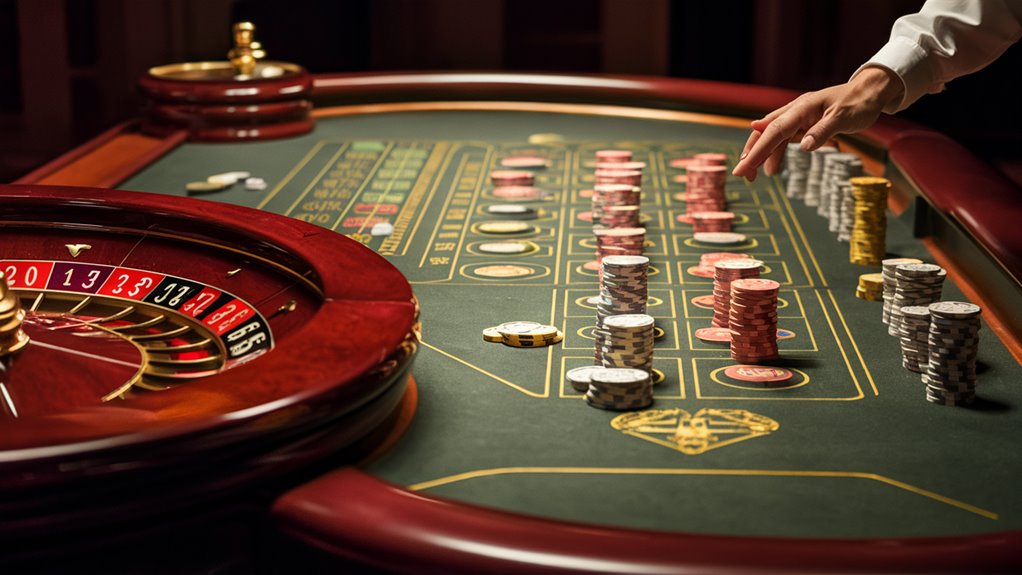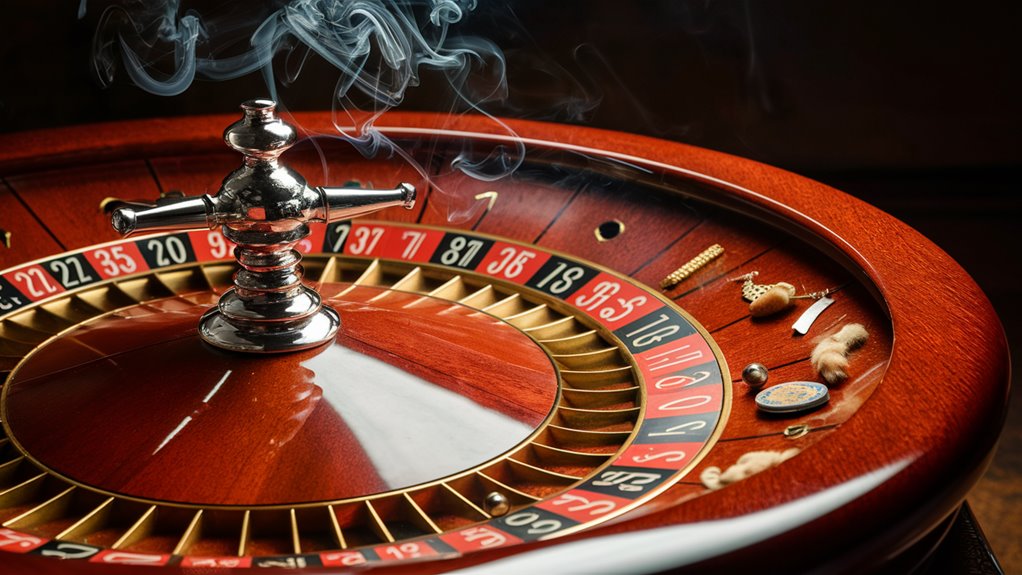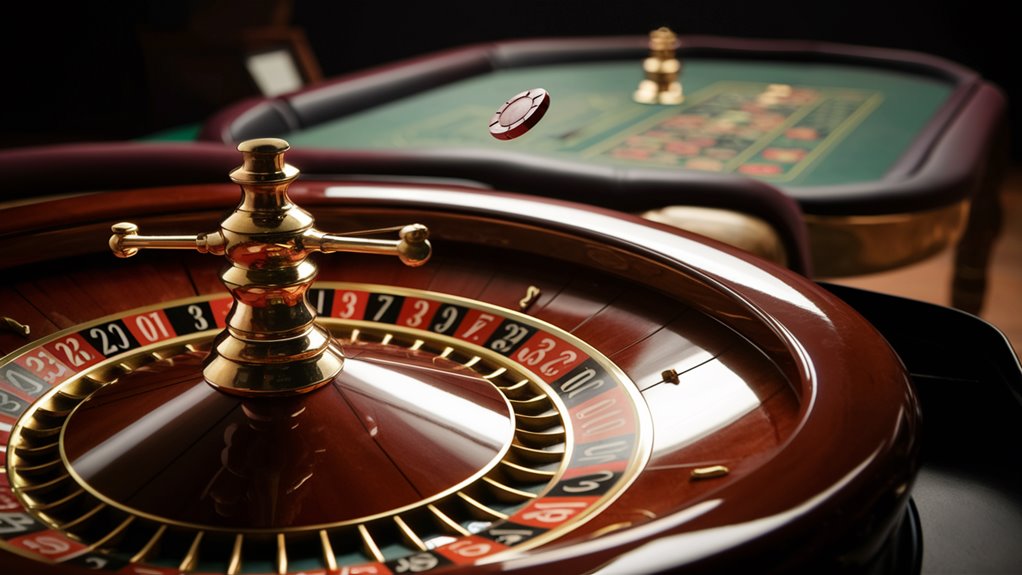Roulette Myths: The Real Science Behind Common Beliefs

Understanding the Math and Luck in Roulette
Roulette systems and betting ways hold the minds of players for many years. Yet, the real math shows us another truth. The fixed house edge is 2.7% in European roulette and 5.26% in American roulette, no matter the plan you use.
Number Study of Usual Betting Systems
Each move in roulette is its own chance happening, so past spins don’t change what comes next. The Law of Large Numbers makes it clear long play matches set chances, short lucky runs aside.
Today’s Casino Tech and Wheel Fixes
Old methods to use flaws in wheel build needed at least a 15% odd shift to work. Modern casinos stop this with:
- Changing wheels often
- High tech checks
- Exact builds
- Regular fixes
Breaking Down Roulette Myths
Hard data tells us no bet way, lucky numbers, or track plans change the real math of roulette. Short win runs happen by chance spread, but can’t tell you what will happen next. Our love for finding links in random events keeps myths alive. But clear numbers show a firm truth: no system beats the constant math edge of the house in the long haul.
The Gambler’s Mistake
The Gambler’s Mistake is a key wrong thought in gambling. It shows up lots in roulette. Players often fall for the wrong idea that what happened before weighs on what happens next. This thinking shows when gamblers think a change is due after events like eight reds in a row.
The Math of Stand-Alone Events
Each spin in roulette is a separate happening, with set odds that don’t shift due to old results:
- European Roulette: 18/37 chance for red
- American Roulette: 18/38 chance for red
The main idea stays: neither the ball nor the wheel keep any memory of past spins. Chance starts fresh each play, making guessing based on patterns not smart.
Stats and Random Order
Checking Patterns
Long checks of roulette outcomes show that odd runs like six blacks in line happen as part of random order things.
While these runs might seem big to us, they are standard chance acts in play.
The Law of Large Numbers
While the Law of Large Numbers says long-term results will line up with expected chances, this rule doesn’t touch single spin outcomes. Each new spin stands alone, free from all past moves.
Knowing Real Luck
The real math stays the same: old spins don’t shape future luck in truly random acts. Watching 1,000 spins or seeing 20 reds in a row, the base luck doesn’t change with each new spin, showing how key it is to understand separate chances in betting setups.
Hot and Cold Number Myths
Getting the Facts on Hot and Cold Numbers in Roulette: Real Stats
The Myth in Number Watching
Hot and cold number tracks are common among roulette fans. Players note often seen numbers (hot) and seldom seen numbers (cold) from past games, building big track plans to chase winning links.
True Stats of Roulette Chances
Each roulette move is a fully stand-alone act, held by firm math rules. The odds are still:
- European Roulette: 1/37 chance per number
- American Roulette: 1/38 chance per number
Ending the Idea of Pattern Spots
Random order things show up often in all run of stand-alone acts. These seen links make an idea of being able to tell what will happen, pushing players to link them wrongly. The truth is:
- Past moves don’t change future spins
- The roulette ball holds no past
- Chance stays the same regardless of history
The Real Talk on Number Times Seen
Number checks of roulette plays show that noted hot and cold streaks are just random happenings in normal chance patterns. This track plan is a deep take on the Gambler’s Mistake, giving no help in telling what comes next.
The Impact on Betting Plans
Using hot and cold number tracks doesn’t help as a betting plan because:
- Numbers don’t become “due” based on past spins
Understanding Roulette Betting Plans and House Edge
Breaking Down Popular Betting Plans
Math checks of roulette betting plans give key insights on their power against casino edges. The most looked-at ways include the Martingale plan, D’Alembert method, and Fibonacci growth. Even with their smart look, none beat the always-there house gain of 2.7% in European roulette or 5.26% in American roulette.
The Martingale Plan Made Simple
The Martingale betting way follows the simple thought of doubling bets after losses. While this looks smart for getting back losses, two big things stop success:
- Table bet limits cap the max bet sizes
- Money running out risk during long losing times
Stat checks show the chance of running into eight straight losses at about 1:256, happening more often than many think.
Proof Against Betting Plans
Full stat checks of many roulette spins show that you can’t turn a likely loss into a likely win with bet progress steps. Key points note:
- Each spin is a stand-alone chance happening
- Past moves don’t change what will happen next
- Always-likely loss stays the same per bet
- Long-term making money is not likely with math
These math rules make it clear that all betting plans finally can’t make lasting money in roulette games.
Lucky Numbers and Beliefs
Lucky Numbers and Betting Beliefs: The Math of Roulette Odds

Getting the Numbers and Odds in Roulette
Roulette odds stay the same no matter the number pick, with European wheels giving a 1/37 (2.7%) chance and American wheels a 1/38 (2.6%) chance for any one number. Even with these set odds, many hold strong to lucky numbers from personal meaning.
Common Sources of Lucky Numbers and Their Real Stats
Players often pick numbers based on:
- Birthdays and big dates
- Meaning in culture (7 in the West)
- Personal times or big past wins
- Numbers that won before
The Mind Game of Betting Beliefs
Confirmation bias keeps these number-based beliefs going. Players remember winning bets more than losses, making a false idea of “lucky” results. This choice memory backs the wrong thought that some numbers have special power.
Math Facts vs. Betting Myths
Stat checks of many roulette spins show:
- Each number has the same chance
- Past spins don’t weigh on future spins
- The house edge is set at 2.7% (European) or 5.26% (American)
- No number run or link can beat math chance
Real Proof in Number Picking
Knowing that luck is just chance and no number has a built-in edge helps players make smarter picks. Winning at roulette leans on getting the math truth over following beliefs about special numbers or runs.
Seeing Patterns in Roulette
Getting Patterns in Roulette: The Math Truth
Understanding Chance in Roulette
Our minds try to find patterns, even in fully random events like roulette spins. Players often look back at past outcomes, hoping to find links, tracking numbers and results with much care. Yet, each roulette spin is its own event with set math chances.
The Math Behind Roulette Odds
In European roulette, every number has a steady 1/37 chance on each spin. When many like results happen in a row, like three reds in line, many think the Gambler’s Mistake and bet on black. But the true chance for black stays at 48.6%, no matter what happened before.
Stats and What Lasts Over Time
Stat checks of many roulette spins show that while short patterns may pop up, they are not key over long stretches. The law of high numbers makes sure true outcomes line up with true math chances over time. Any seen patterns just happen by chance, as the roulette wheel works without any memory or past pull.
Key Chance Points:
- Stand-Alone Events: Each spin is cut off from all others
- Set Odds: Numbers keep the same odds no matter what happened
- Random Spread: Patterns don’t tell what comes next
- Math Surety: Long-term results match true odds
Seeing patterns in roulette, while pulling us in, doesn’t really help in guessing what will happen next. Knowing this firm truth aids players in making choices based on real chance instead of seen patterns.
Wheel Fixes and Section Betting
Getting Wheel Fixes and Section Betting in Roulette
Wheel Fix Analysis
Real flaws in roulette wheels make stats links that change game results. Build errors, wear spots, and not right leveling can really change the ball road and where it ends up. These build slips let sharp players spot good betting parts.
Data Needs for Checks
Seeing true wheel fixes calls for hard stat analysis over many recorded spins. Expert checks need a 2-3% mistake space to confirm real patterns. Modern casino work fights bias use through steady wheel care and changing wheels between tables.
Plan to Bet on Parts
Smart part betting looks for number groups beating the usual 1/37 chance in European roulette setups. While short stat changes happen by themselves, a bias you can use needs at least a 15% chance rise over set math odds to beat the built-in house edge.
Today’s casinos use smart tech watch setups to spot odd patterns, making long bias use hard in new gaming spots.
Signs of Bias
- Build wear signs
- Build slips
- Not right leveling
- Stat changes
- Number group chances
Smart Spot Ways
- Long checks
- Stat chance maps
- Pattern find setups
- Tech wheel watches
- Chance spread tracks
Money Care Ways
Money Care Ways for Roulette
Getting the Casino Edge and Money Care
Smart money care is key for good roulette play. Players must keep to set bet limits and know when to stop while seeing the always-there house edge – 2.7% for European roulette and 5.26% for American roulette.
Looking at Popular Betting Plans
The Martingale Plan
The Martingale betting way needs a lot of money for little possible win. With a $10 first bet, players need $2,560 just to stay in through 8 straight losses – a run that comes about every 256 spins. This math fact makes the plan not work for most Maximize Your Odds
The D’Alembert Plan
The D’Alembert way goes up slower than Martingale, using smaller growth steps. While this way uses money slower, math shows it can’t win over time against the house edge.
Tips for Good Money Plans
Steady Bet Plan
Flat betting keeps outcomes easy to see and helps keep better track of money. This way keeps bets the same all through play, and does better in stats than going up and down.
Rules for Play Times
- Set a top loss cut of 10-15% of all money for each play time
- Keep strict rules for when to stop when limits are hit
- Set min bet sizes based on how long you want to play
- 온카스터디 먹튀검증소 확인
- Example: $500 money with $25 bets gives at least 20 bets
The Plus Points of Stats
Short play control with clear cuts lowers ups and downs in game outcomes. This way keeps your money safer than going up and down in bet sizes, backed by full chance checks.
Bringing together steady bet sizes and set money rules sets up the best plan for careful roulette play.
